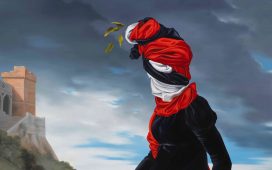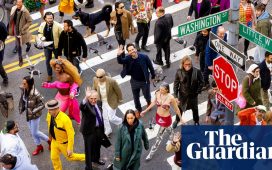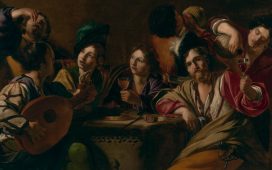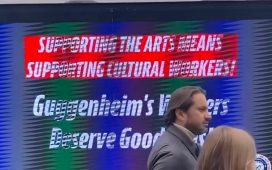Domenico Piola, The Coronation of the Virgin (around 1695), oil on canvas, Musei di Strada Nuova, Palazzo Bianco, Genoa
© Musei di Strada Nuova
Museums everywhere are unveiling their big fall exhibitions this month, but sadly, one major show that would have been a jewel of the season is not opening. In mid-August, just five weeks before A Superb Baroque: Art in Genoa, 1600–1750 was due to open on 26 September, the National Gallery of Art in Washington, DC cancelled it. The museum cited “multiple factors related to the worsening COVID-19 crisis,” including “uncertainties” about shipping its many masterpieces from Europe, safety concerns for the art handlers who must work closely to take down these works abroad and others who would reinstall them here, and the fear that the National Gallery may again be subject to a closure, which might change the schedule and perhaps prevent return shipments to Rome, where the exhibition is expected to open in March.
The implication: prudence dictated the decision.
But did it? Many curators The Art Newspaper has spoken to, eagerly anticipating this exhibition of 128 sumptuous paintings, sculptures and works on paper that elucidate Genoa’s golden age—many never seen in the US and unlikely to be offered again—are incredulous. They fear that the decision had more to do with director Kaywin Feldman’s vision for the National Gallery than the pandemic. As she told The Art Newspaper last year: “We want to attract the nation and reflect it, too, in our exhibitions, our permanent collection and our digital reach.” By necessity—there is only so much time and space on the exhibition schedule—that will mean de-emphasising European art, especially older art made by white males.
Gregorio De Ferrari, The Death of Saint Scholastica (around 1700), oil on canvas, Museo Diocesano, Genoa, on deposit from the Abbazia di Santo Stefano
Photo: Luigino Visconti
Let us be clear: inclusivity and diversity are laudable goals. And Covid is causing problems for museums. But the NGA’s critics—mainly curators who are grappling with the same issues—have good answers to each rationale given by the NGA for cancelling the exhibit. For example, the museum had more than a year to deal with the required paperwork; it could have used virtual couriers; fewer than a handful of works on the checklist (possibly only two, one of which had been taken down for conservation fairly recently) required difficult dismantling. As for the exhibition in Rome, if only one venue could be saved, would it not make more sense to introduce the American public, more than 4,000 miles across an ocean, to this glorious but relatively unknown center of Italian art, than to send it just 300 miles to the south?
Other museums, these critics point out, have risen to the challenges posed by Covid. “Perhaps,” says one curator, who asks to remain nameless, “they should have tried harder to save this important show, even deprived of some loans.”
These complaints are not cries to maintain the status quo in museums. But why sacrifice this show? True, the Genoese artists in it, like Bernardo Strozzi, are not well known in the US and may not on their own have lured crowds. But Genoa attracted other artists, like Rubens and Van Dyck, who are marquee names, and A Superb Baroque would have helped correct the traditional imbalance that favours he art from Venice, Genoa’s historic archrival.
Lorenzo De Ferrari, Alexander and the Gordian Knot (1740/1744), oil on panel, Musei di Strada Nuova, Palazzo Bianco, Genoa
Courtesy of Musei di Strada Nuova, Photo by Luigino Visconti
Scholars, conservators, registrars, government officials and others have invested thousands of hours preparing for this exhibition—assessing the condition of requested works, undertaking the required conservation, preparing what often amounts to mountains of paperwork, negotiating loan terms, insurance and shipment details, among other necessary steps. The NGA shredded all that work at the very last minute.
Caught short, Italian officials are said to be furious. Calling the questions raised “pertinent,” Piero Boccardo, the superintendent of the City Collections of Genoa, provided a diplomatic statement: “I am very sorry for the choice of the National Gallery of Art to cancel the exhibition on Genoese Superb Baroque. This is not only because, together with Jonathan Bober [a senior curator at the National Gallery] and Franco Boggero [the director of historic and artistic heritage at the Soprintendenza Archeologia, Belle Arti e Paesaggio of Genoa], I worked for five years on this exhibition project. And not even for the fact that I have dedicated a part of my career to better know Genoa and its art in the world. But above all, because this was the best opportunity for Genoa in the USA and was cancelled on the eve of the inauguration.”
Antonio Travi, Shore with Fishermen and Ruined Tower (1650/1655), oil on canvas, private collection
Courtesy Galerie Canesso, Paris
Killing the show so close to its opening was cruel. Like a diplomatic rift, it may even jeopardise future cooperation from Italy, which regularly extends generous loans to the NGA and other museums in the US. Will officials in Italy—or anywhere—be willing to spend time on a task that might never happen, cancelled by a director who, insiders say, had always been sceptical of the show?
As one curator said: “It’s a sad day for the National Gallery.”
I have a dream outcome: that another American museum will step forward and take the show in late 2022 or 2023, after its presentation in Rome. It would have to be a major museum with a commitment to broaden Americans’ exposure to great art, including pre-contemporary works, such as the Getty in Los Angeles, the Cleveland Museum of Art, the Kimbell Art Museum in Fort Worth or the Museum of Fine Arts in Houston. It would take effort to rearrange schedules, but where there’s a will, there’s a way.









